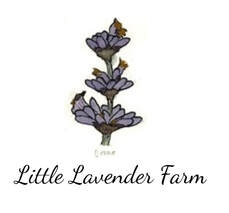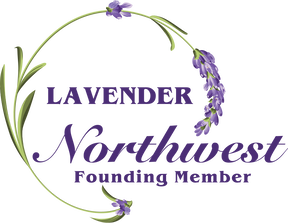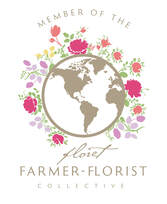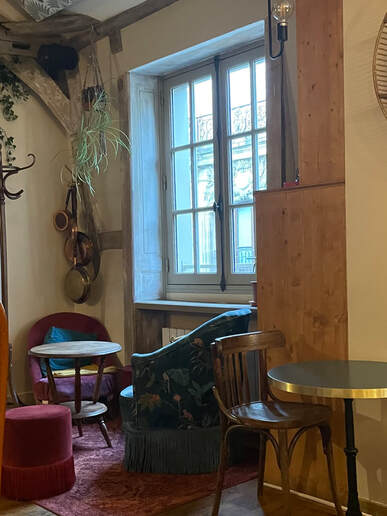 On our last day in Rennes, we head over to our favorite bistro, the Bistrot Cocagne, just outside our apartment. We greet the waiter, Antoine, who we have come to know a little over the last few weeks, and then head upstairs to settle down in the old beat up turquiose upholstered chairs, which were taken (I’m sure) from someone’s grandma’s house. Plants hang from the rafters and art decorates the walls. And I feel like I’m hanging out in an old friend’s home. We fell in love with this place right away, its chalkboard sign outside with the day’s offerings leaning up against the yellow wall, wicker backed chairs, wooden tables, and umbrellas set up outside the restaurant and groups of people gathered together, drinking a coffee or glass of wine or eating lunch. It’s a community hangout. We see people greet each other with the double kiss and conversations filled with laughter. The inside is just as cozy and welcoming with old sofas and easy chairs, along with small tables for intimate conversations. We could hear the quiet buzz and murmur of the restaurant from our apartment if we opened the windows –the perfect background noise as I read or wrote or tidied up. I remember our first time there when I sheepishly tried to order in French, apologizing in advance for any mistakes: “Une galette avec oeuf e frommage s’il vous plait,” I said haltingly. But Antoine rewards me with a smile. “Perfect,” he says. Later I ask him the correct pronunciation for a few words and he is happy to help. He asks (in English) where we are travelling from and a few other questions and I am struck that he could so easily move back and forth between the two languages, as could most of the people we talked with. It’s such a generous act to learn multiple languages so that you can better communicate with your fellow humans. The Bistrot Cocagne isn’t an anomaly though. There are neighborhood bistros all over the city, on every corner, people spilling out into outdoor tables and chairs and spending hours talking laughing, eating, just enjoying the day. It’s clear that this sense of community is important to the people of Rennes. Everything (except restaurants of course) closes down between 12-2 while friends and coworkers spill out of their offices and shops and homes to gather and share a meal. And then gather again when the days is done, late into the evening. How does this sense of community make a difference? Well, from what I could see, there was a great sense of pride that priortized the care of their city. For example, there is no trash littering the streets. And while there is graffiti, I noticed that it mostly shows up on temporary structures, like plywood used at a construction site or wood that can be easily painted over – rarely on the beautiful stone buildings. I saw very few police and yet I always felt safe walking around everywhere, even late at night. As in every city, there are homeless people, but very few. I am told that they are provided services to help them get on their feet. Other residents talk with them and give them their change. They too are part of the community. This is what I love about being able to travel to new places in the world – the possibilities that emerge. In Rennes I see a city that prioritizes community and the results of that. I see a place where the residents take care of and inhabit their public spaces as an extension of their homes, where the harmony of the city is cherished and protected, and where people of all backgrounds are welcome– even these two Americans with their limited and halting French. At the end of our meal that afternoon, Antoine comes up to ask if we would like anything else. “Coffee?” he asks, “I will pay.” Our initial impulse is to decline such generosity, but on second thought we accept this kind gesture as the ultimate compliment. Just as you would provide coffee for guests in your home, it is clear that we have been accepted into this small community. What a beautiful city this is. What a beautiful people. What a wonderful example of what we could be.
0 Comments
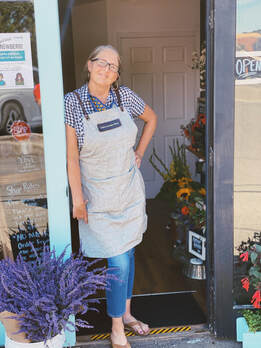 Three years ago I got the keys to our Little Lavender Shop, and I can’t help but look around and reflect with profound gratitude on the path and the people that have gotten us here. It boggles my mind that what started as a visit to a lavender farm in San Diego county one Sunday afternoon has ended up here. Or how having a frustratingly hot, dry, south facing slope full of decomposed-granite where Mark and I planted our first lavenders started all of this. When I think about it for a minute, however, that lavender farm visit and the hot, south-facing slope aren’t really where it all started. It really all started with taking chances and saying yes. I’m not naturally a yes kind of person. In fact, for far too long, I shied away from saying yes to things that were new or different. I must confess that I spent a good part of my early life living in fear – afraid to travel, afraid to explore, afraid to take chances, afraid to interact. I was very introverted, the proverbial wall flower with a very active internal dialogue -- but who stumbled and stuttered through any real interaction, red-faced, sweating. But then I got a job at a local grocery store in the small desert town where I grew up, and though I was scared to death on that first day, I said yes and took that baby step forward, slowly becoming more comfortable in my skin and learning to actually talk to people. This slowly built my confidence enough that I said yes to a move to San Diego, where I went to college, but struggled for years to balance school and work, afraid to fully commit to school. Then one day, I was offered a grocery management position and had to think long and hard about whether or not this was what I wanted to do with my life. Sure, it was easy, and I was good at it. But was that what I really wanted? The answer to that question was no. Instead, I decided to say yes to full time school. I transferred to a grocery store closer to the university, finally figured out my major, and then met my sweet husband while we were working in the produce department together. The next few years included more yeses, including an “I do,” and a move to northern California for graduate school, and then an eventual move back to San Diego where I began my English teaching career. There I enjoyed a very comfortable part time teaching gig at a local community college while we raised our children, with all of the joys and challenges that come with it. But then one day I was offered a full time position at a local high school and I had to contemplate another yes. This yes led to challenges unlike anything I’d known, helping me to realize that embracing new, sometimes scary opportunities can lead to experiences that shape a life and a mindset -- like saying yes to international trips with students, saying yes to a summer teaching in South Africa, saying yes to becoming the editor of an education journal, and then finally saying yes to a move to Oregon and becoming a full time lavender farmer. None of those experiences was easy, in fact some were downright scary, but through them I realized that I am resourceful and capable. And that there's a lesson to be learned in every experience. Once we moved to Oregon however, the yeses hadn’t stopped just yet. When I was presented with the opportunity to open a little shop in this tiny space and work with three dear friends, John, Jeremi, and Zach, I said yes without even hesitating. At this point, I knew a golden opportunity when I saw it. Once we had the keys though, I started to wonder if this was one of those yeses that wouldn’t work out. We got our keys on March 3, 2020 and then a few weeks later everything shut down. However, I soon realized that this was just one more challenge to overcome, especially since I had the best shop partners a girl could ask for, so we took that time to remodel the shop and slowly open up. I was lucky enough to work with these friends for two years before they struck out on their own. So last spring I was faced with another question that I needed to answer. Was I capable of running this shop and the farm by myself (for the most part)? As it turns out, the answer is yes. It’s not easy, but it’s a privilege that my days are spent working to put something beautiful out into the world, to offer a little comfort in our crazy lives, and to get to know the good people in this little lavender community, both in the shop and online. I’ve been so touched by the kindnesses I get to witness every day – the gifts and cards you buy for each other and the care you provide for yourself. I realize how lucky I am. And I don’t take that for granted. In fact, most mornings, I still wake up and pinch myself, not sure I deserve such good things. So I guess in the end, what has led me here, living in small town Oregon, living the lavender dream, is the word yes. I recognize that yes isn’t always the correct answer. Sometimes no is the right choice. And believe me, there have been times when in trying not to disappoint, I’ve said yes when the answer should have been no. However, I also believe that we sometimes say no because we are scared, forgetting that we are capable of much more than we realize. So here’s to saying “yes” – and hoping that there are more opportunities to say yes in the days and years ahead! Bring on the next adventure! 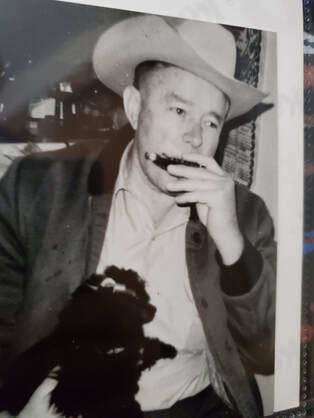 Have you ever gone through the Starbuck drive-thru and had the person in front of you pay for your drink? Don’t you just love when that happens? It’s such a surprise and then creates a ripple effect, continuing on with the next car, changing the day’s trajectory, and giving everyone in that line an opportunity to do something nice for someone else. All because of one person’s actions. Whenever that happens to me, I’m reminded of my Grandpa Reynolds. Starbucks wasn’t around when he was, but his actions created that same ripple effect. In fact, he was a pay-it-forward legend among those who knew him, striving to make the world a little kinder. If you were to look at his vital statistics you might think hmmm, there’s nothing legendary about him. Born Cyril Holcombe Reynolds in 1914, married to the Winifred King, five children, active church member, worked in a hosiery factory, then as an insurance salesman and then later, with Winnie, opened a slipcover business. Died due to complications of Alzheimers in 1996. 82 years on this earth. What you don’t see on paper, however, is the lasting impact he had on those around him. For example every day he did at least one good deed, whether it be something small like holding a door or picking up a piece of trash, or something bigger like driving someone to a doctor’s appointment or helping a neighbor with a project. Those good deeds had an effect, not just on the recipient but also on the observer. Some of my favorite days as a child were those spent with my grandpa running an errand or two and watching as he opened a door for someone and then announcing to me “Well I did my good deed for the day!” (Though I suspect that he never stopped with just one). That example has stayed so fresh in my mind, that even today I try to do at least one good deed every day. He treated those around him with such love and care. He couldn’t do much to affect the larger world, but he sure worked hard to take care of those in his own backyard. And I like to think that those small deeds eventually reached out into the larger world. He gave joyfully and he also lived joyfully. You couldn’t help but smile when he was around. His contagious laugh could turn the grumpiest person into a giggling mess. We kids used to love sitting with him as he watched one of his favorite TV shows, HeeHaw. We certainly didn’t get the jokes, but when he started laughing, we all started laughing. Another great memory is car rides with him. He used to love to take us up the mountain in his giant station wagon, where he accelerated around curves and over hills in the road, his laugh accompanying every curve, every hill. Something so small, but he found such delight in that small activity, along with such things as playing harmonica accompanied by Pepe his dog, long walks after dinner, working in his garden (and then giving us a tour every time we visited), or jiggling our chins as we tried to stammer out our names. All of these simple pleasures he delighted in. Life was certainly not easy at times; he had some pretty difficult challenges in his lifetime, but he lived with joy, seeking out those things that made him happy and paying that happiness forward. Grandpa has been gone now for 27 years, a lifetime. But the ripple effect of his joyful life continues on with his children, his grandchildren – and beyond. Sometimes when I’m feeling a bit overwhelmed by the big problems of our world, I think about my grandpa – and then I go to Starbucks and start the pay-it-forward line. It’s such a small action, I know, but it’s a start and maybe it will ripple. And it reminds me that there is a lot of good out there, a lot of people trying to make the world a little better, a little kinder, a little more joyful. One good deed at a time. 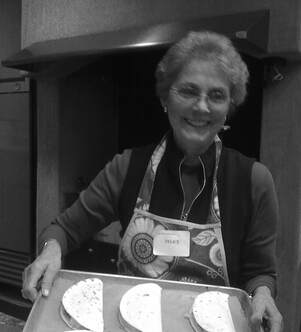 It was Christmas cookie baking time and I was scouring my cupboards for all the necessary ingredients: flour, sugar, brown sugar, oats…but where was the shortening? I knew I had shortening in there somewhere, so I started pulling things out of the cupboard, finding stale crackers, a long forgotten pizza crust mix and multiple bags of polenta (because apparently you can never have too much polenta). And then there in the back corner behind the yellow cake mix and three bottles of Karo corn syrup was the stuffed-full recipe box I had grabbed during the fog and trauma of clearing out my mom’s house. I had actually forgotten that I had that box, so I opened it up and started going through it, my heart clenching as I saw the notes she had taken in her dainty handwriting about each recipe. One of the recipes had a letter grade on it, and I remembered that there was also a binder that I had grabbed where she had gathered her recipes in a more organized way, with each recipe assigned a letter grade. I looked up at my cookbooks and there it was, her blue binder, patiently waiting for my attention and filled with recipes she had carefully cut out from various magazines, graded, and grouped together. I never did find the shortening, but instead I found something infinitely better. Looking through these recipes, I was transported to the many family gatherings where her hostess skills were on full display: the crab dips, the cheesy potatoes, the rum cakes, and of course, the lasagnas. When I got to the end of the recipes, I noticed that there were 5-6 blank pages left to fill and realized that this must have been a project she had been working on, gathering and organizing her favorite recipes. As I flipped to the end, I found in the back plastic pocket, lists and lists of her menus for every party and gathering she had hosted over the years, noting the occasion, who was attending, who was bringing what, and what she would be cooking. And in that moment I could feel her presence so clearly – and her steadfast, unfaltering love. So, as when she was alive, we had a nice little chat. My mom’s recipe collection got me thinking. Her gatherings always had such a spontaneous, light feel to them, but these recipes and lists gave me yet another insight into my mother. As with everything in her life, those parties were planned with so much care, so much energy, and such a purposefulness that we always felt, even if we couldn’t put a name to it, that we often took for granted. Her house was always warm, welcoming, beautifully decorated, and full of good food, with no expectation that you bring anything other than your good cheer and sense of humor – and perhaps a willingness to sing a song or two (especially at Christmas). Her parties were legendary in the little desert town where I grew up, and I’m sure that they are talked about to this day by her friends, who have tried to carry on her legacy. But she was the spark plug for both her friends and her family. Though we kids were scattered around the state, she insisted on us gathering, even if we didn’t really feel like it at the time, and made it as easy for us as she could. The drive might have been a bear, but as soon as we walked into the room, the smiles, the laughter, the silliness began and we couldn’t imagine missing any of it. Our bellies were always full, and our cups were too. Cooking was her love language. Thanks to my mom, I have years and years of fond memories of family card games, Sound of Music singalongs, glider flying contests, making mom laugh until she cried, inside jokes, and a bond that might have fizzled out without her constant fanning of the flames of family connection. Thanks Mom, for such a lovely, unexpected Christmas gift. And thank you for reminding me to love as fiercely and to live my life as intentionally as you did. These are my New Years goals. (And to make a few of those A+ recipes that you gathered.) 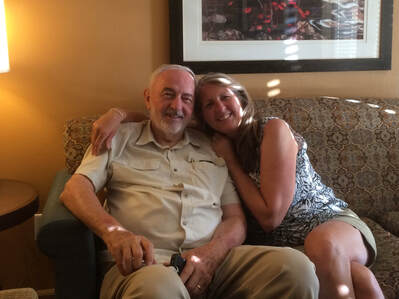 “Promise Yourself To be so strong that nothing can disturb your peace of mind…” (The Optimist’s Creed) A few weeks ago my Dad had to make the difficult decision to admit my stepmom Sylvia to a memory care facility. He and Sylvia’s daughter had cared for her for as long as they possibly could, but realized that they were no longer able to give her the care she needed. As I talked with him on the phone, checking in to see how he was doing, he said something interesting, but not surprising. He said, “This has been one of the hardest times of my life, but each day I can decide to be happy, regardless of the circumstances.” This really struck me because my dad has been through a few really difficult situations, and for him to group this current experience in with those other experiences told me everything I needed to know. My dad is what you might call a practiced optimist…in fact, he was a member of The Optimist’s Club for many years. My earliest memory of this inner strength came when I was a teenager. When I was young, my dad owned a tire and auto repair shop in the little desert town where we lived. It was a family business. My mom was the bookkeeper and I got to help her after school and during the summers. The business was a lot of work for my dad, but his efforts were starting to pay off as the business grew and he added new products and services. One warm summer day, when they were both working at the store and we kids were at home, my mom called us. Not unusual since she checked in with us pretty regularly. But this time was different. The first thing she said was: “Your dad and I are OK. But I want you to know that there has been an accident here at the store. I’ll tell you about it when I get home.” I went outside and looked in that direction and could see a plume of black smoke rising into the air. I wasn’t sure what to expect, so I waited for my mom to get home to fill us in. It turned out that one of my dad’s employees was playing around, welding a paper cup on top of an empty oil drum, and it exploded, killing him and severely burning another employee. As you can imagine, my dad was devastated, first and foremost because of the death and injury of his employees, but also because in the aftermath, my dad lost his business and our family was bankrupted. I remember my dad being understandably depressed after this event, but with my mom’s help, a reconnection to his faith, and the Optimist’s Creed firmly in his mind, my dad made a choice: he chose to believe that things would get better. So he got an entry-level job at a local factory, and slowly worked his way up until he was in management. I think back on that now and I’m really floored by this. To have everything you’ve worked for in your career stripped away, to carry the burden of the death of an employee (though he wasn’t found at fault), to be financially ruined, to have to start at the bottom again. I don’t think many people would have the strength of character that my dad (and my mom) had to navigate this with such grace and optimism, becoming even more involved in their community rather than isolating themselves. I think I’ve taken this for granted, assuming anyone would do the same. Don’t we all do this though, take our parents’ stories for granted, for good or bad? We assume that what they’ve experienced is what other people experience and how they respond to those experiences is how other people would respond. And it’s only as we get older and see other people’s stories that we realize how unique our own parents’ stories are. We start seeing our parents as people instead of just as our parents. The accident at the tire store and its aftermath was a really difficult time for my dad, and now he’s going through another really difficult time. And yet he faces each day with that same grace and with optimism, looking for the lesson or the blessing, cherishing his time on this earth. He isn’t bitter. He doesn’t quit. He doesn’t hide away. In fact, he works really hard to continue to be a blessing to his community, making rocking chairs for children with disabilities, organizing an essay contest, and volunteering in his church. As he said recently, “you’re going to be disturbed in this life, but you have to find a way to retain your piece of mind.” I can only hope I have the strength of character to meet the challenges that lay ahead with the same grace and the same optimism. 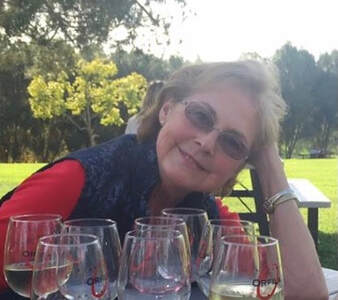 I ran across my mom’s obituary the other day. Her birthday is coming up and I’ve found myself really missing her lately, so I’ve been looking at old photos and memorabilia. As I reread what I had written for her obituary, I was reminded of what a truly remarkable woman she was: her many accomplishments, her generous spirit, her love of life, and her love for her friends and family. But I was also struck by the fact that I had left out one of her most defining characteristics. Thankfully, the Daily Independent newspaper’s editor, who was also a great friend of my mom’s, added her own comment at the end and filled in what I had missed. She said: “While we join her many loved ones in mourning her loss, we are grateful for the indelible mark of kindness she left on virtually everyone who was fortunate enough to know her. —Ed.” An “indelible mark of kindness.” What a perfect summation of how my mom lived her life and the impact she had on those around her. Kindness was her superpower. She responded to almost every situation with kindness, love, and humor. She was the first person to volunteer to bring meals or lend an ear to an ailing friend. She elevated, encouraged, and celebrated those in her life. And she could diffuse the most tense situation just by being kind. Here’s a small example of that: One time when we were camping on Lake Isabella, a rowdy group of campers was keeping us awake into the wee hours. Finally, my mom had enough and decided to go over and put a stop to it. But she didn’t go over in anger as I might have. Rather she walked over with a smile on her face and kindness in her pocket, introduced herself to the group, joined in their fun for a minute or two and then with her characteristic good humor asked that they tone it down a bit since we were all trying to sleep. And that was all it took. Her kindness was disarming. And it was transformative, and indelible. She always saw the good in people and worked under the assumption that people really wanted to do what was right. But she was no pushover. Yes, kindness was her superpower, but her strong sense of justice, or what she called logical consequences, was her sidekick. If we kids make a bad decision, we got to reap “the consequences of our actions,” though those consequences were always paired with a hug and a conversation. How fortunate we were to grow up with that combination of kindness and justice. So there are two questions I’m pondering today regarding her kindness. The first is why. This was a woman who was abused by her father as a child, whose mother abandoned her family and who lived in foster care with a few horrible foster parents. And that was just the first few years. At a young age, she saw the worst of humanity. And yet...and yet she was the kindest person I’ve ever met. How did that happen? I can’t help but assume that so much of her kindness emanated from her great faith. I’m reminded of the verse: “He has told you, O man, what is good; and what does the Lord require of you but to do justice, and to love kindness, and to walk humbly with your God?” (Micah 6:8). I have to believe that this must have been one of her favorite verses because that is how she lived her life. She didn’t pontificate or wear the trappings of Christianity or do anything that would create a barrier to anyone she met. Rather, she lived that verse, providing the world a genuine example of God’s love -- and leaving an “indelible mark of kindness” in her wake. My second question is: what she would think of these times where so many are being so unkind. How would she respond? I’m sure her poor heart would be breaking to see the discord so prevalent in our country today. I’m sure she would be dismayed by the unkindness of some of our elected officials and their followers. But I also know that her response would be to redouble her efforts to love as many people as she could and disarm them with her kindness. And at the same time, she would demand justice. I’m quite certain that she would be out there marching and writing letters and talking to her neighbors, and imploring us to look inward and reconnect with the goodness we each possess. And she would demand consequences for those whose actions warranted it. My mom continues to inspire me, even after almost five years since she left us. Her example encourages me to both be more kind and to be more courageous as we head into another year. That is her legacy. And that’s how we change the world. 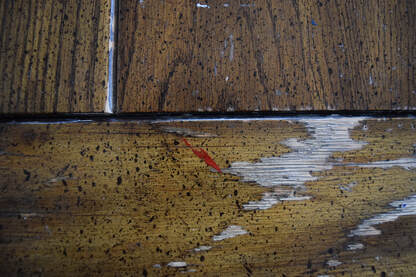 When we moved to Escondido 25 years ago, our house came with a dining room table — a giant, heavy, slightly beat-up dining room table. The owners were moving to Hawaii and didn’t want to lug the table with them across the ocean, so they left it for us. Now, 25 years later, that giant, much more beat-up table sits in our dining room in Oregon. Sometimes I wonder why I haven’t gotten a new one. This one is kind of a wreck. I know that farmhouse rustic is in, but this table goes just a bit beyond that. I've tried to make it look presentable, but I can’t seem to clean off the red and white paint marks that were added when Lauren made Christmas ornaments one year. And I’ve tried to chip away at the spots that look like food but are actually glue from the glue gun that Noah used when he was working on his robot -- but when I chip away at it, the varnish comes off too. And then there’s a gouge at one end where Joshua was working on some project with Jesse that involved an axe. And the varnish in the grooves is pretty much gone from when Mark used a steak knife to get the food particles out. Also, one of the legs has teeth marks from when Jake was a puppy and used the table leg as a chew toy. Thankfully you can’t really see that unless you look down. And every morning as I’m eating my breakfast, I have to push in the end of the table since it hangs down a little, maybe from all of the elbows-on-the-table conversations we have had over the years. Yeah...it’s kind of a wreck. Maybe I should get a new one. Thanksgiving is coming and I want everything to be nice. But I can see our family dinners and our kids doing their homework at this table. And I can see my mom sitting at the table setting up her appetizers for our "March birthday" get togethers. I see the large holiday dinners where everyone could fit (thanks to two also-very-heavy leafs that made a giant table even bigger), and the smaller dinners with our Japanese exchange student or guests from England or friends or co-workers. I can see the long conversations Mark and I had about the kids, or about his company closing or about us moving to Oregon. A lot of life happened at this table. And it shows. How could I possibly replace it? So in a few weeks, my family will gather around the table, eat lots of good food, drink lots of good wine, laugh ourselves silly, and continue to make memories. And they won’t care about the paint and the glue and the gouges. They will just be glad that we are sitting around a table together. And we will count our blessings — one of which will be that 25 years ago, this beat-up old table was left behind. 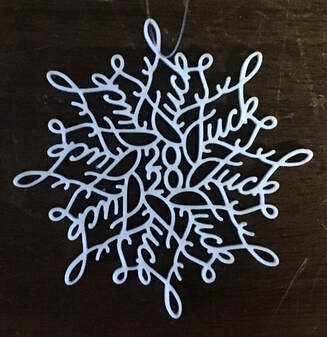 I’ve started and stopped a few different essays for this month’s newsletter...one on the importance of honesty, one on growth mindset, one on what we all can learn from 2020. But none of them seemed quite right. It’s easy for me to sit here in my comfy warm living room and pontificate about what WE can learn from this experience, but everything I wrote rang hollow. There are so many people who lost so much this last year-- family, friends, relationships, jobs, homes, community. So it feels quite arrogant for me to think I have anything worthwhile to say that could sum up our collective experiences with 2020, because they have been wildly different. Sure, there are some common experiences -- zoom calls, empty toilet paper shelves, or the struggle to find the right mask. But as far as lessons learned, that is a very individual experience. So I guess all I can really do that feels authentic is to share what I’ve learned, and hope that it resonates with a few of you out there -- recognizing that my experience is very different than that of so many others. So here are just a few of the many lessons I am learning. Lesson 1: The Little Things Every year at Christmas time, our good friend Scott sends out a Christmas letter unlike any Christmas letter I’ve ever received. In it, he chronicles the little things...things he noticed about his wife or kids that made him proud or made him laugh (usually the latter) -- things like maybe how his daughter pirouettes down the hallway or the way his son lays down next to the Malibu lights in their yard. This year, I am learning to be more like Scott...to notice and appreciate the little things. Bright pink sunrises, fresh green eggs, drizzly walks,the gift of art, the joy of Lauren’s shepherd’s pie, tuna sandwiches heavy on the relish with Mark, ridiculous zoom calls with my boys, Rammus’ specific bark when he sees Lauren. I resolve to continue to notice and cherish these small joys once things get busy again. Lesson 2: Community I’m inspired by the people in our community of Newberg/Dundee. I’ve watched them step up during this crisis, feeding people, organizing “gofundme”’s, opening their homes, supporting mental health, “pivoting” again and again. I am so grateful and inspired by their generosity and kindness. I am trying to be more like them. I have found some really amazing organizations to donate to (YCAP, Oregon Food Bank, World Central Kitchen, Legal Defense Fund are a few of my favorites) and have found great joy in being able to support their work. One of my favorite quotes by the great Dr King inspires me to do better: “We are caught in an inescapable network of mutuality, tied in a single garment of destiny. Whatever affects one directly, affects all indirectly.” My community includes amazing and supportive family and friends, who I realize I have often taken for granted. I have watched the anguish of those who have lost loved ones and my heart aches. I can only pray that mine stay safe during this time. I am especially in awe of and grateful for my husband Mark, who is fixing our refrigerator as I write this and who works tirelessly to make our life together as fun, as meaningful, and as full of love as he can. He is a prince among men and I know that I am lucky (He says I should take this part out but I REFUSE!). I resolve to tell him (and all of my family) that I love them much more often. Lesson 3: Truth = Growth During my time as an English teacher, I was a big fan of “growth mindset.” For those of you unfamiliar with the term, it just means a willingness to step outside of your comfort zone, to take risks, to seek out more information, to acknowledge mistakes and learn from them. Someone with a “fixed mindset,” on the other hand, will blame others for their failure and see it as an indictment of their character or worth. 2020 was the ultimate “step out of our comfort zone” and I was so inspired by the successes -- Red Hills Market’s roller skating take out, Rosmarinos’ daily Instagram video describing their specials, Ruddick Wood feeding those who were evacuated from local fires -- and that’s just a few examples from this one community! There are so many others -- I’m sure you can think of a few yourself. While there were many successes, there were also plenty of failures that we can learn from, mostly from our elected leaders, quite honestly, who tended to blame others and not address the problems we are facing in any meaningful way. Leaders who would hide the truth rather than admit a failure. I have realized that I would much rather be told a hard truth than live in a fantasy. With the truth, I can prepare, offer support, and do what I can to help. If I don’t know the extent of a problem, how can I prepare? I resolve to approach 2021 with honesty and a growth mindset. To take a good long, honest look at myself and what I can improve. How can I do better? How can I be part of the solution? And I resolve to seek out the truth, even if it’s uncomfortable. Lesson 4: Speaking Up I have been inspired this year by the many people who stood up to protest a wrong they saw in their community -- and I am so thankful for the mostly young voices that emerged to lead us in demanding a better world. I have been especially inspired by the courage of my shop partners John, Jeremi, and Zach and their willingness to call out a wrong, often receiving backlash or losing relationships in the process. Because it’s not easy to put your voice out there. I have very different views than some members of my family or some longtime friends, so I often stay silent in order to keep the peace. But I’m realizing that if I am silent in the face of injustice, I am complicit. So I resolve to speak up more, even at the risk of straining or losing some relationships. So that there are just a few of the things I learned from 2020, with I’m sure more lessons to come in 2021. Thank you for indulging me. Happy New Year friends! Wishing you a more gentle, calmer, kinder year! This is certainly a holiday season like no other.
Usually, right after Thanksgiving -- after we’ve gathered with friends and family and stuffed ourselves with turkey and stuffing and mashed potatoes and the many many other required delicacies of the day -- we are off to the holiday shopping races, that frenzied time between Thanksgiving and Christmas/Hanukkah/Kwanzaa where we plan, and budget and make lists and shop and make cookies and send holiday cards and shop more and gather for parties and eat more and drink more and shop just a little more and keep going, going, going until we finally flop in front of the tv on New Year’s morning half watching football in between naps and shoving those chips and dips and an occasional carrot stick into our yawning mouths. Exhausted. And many of us promise that next year we will focus on what is really important, make more of our gifts, send more than just a photo card, slow down and really savor the season. Could it be that the universe is calling our bluff? With so much uncertainty and so much pain, it’s hard to fall back into those habits of yore. We hear about a neighbor’s father passing away or a friend losing their job or the former roommate who has COVID and it’s hard sometimes to even feel festive at all. We are asked to stay home, to social distance, to wear masks and it all starts to wear on us. And it’s hard to imagine that anything good could come from such a time. But really, if you think about it, we have been given the opportunity to rethink our lives, including how we do this holiday season -- and actually do things differently this year. Maybe this year, the focus won’t be on the giving of the traditional mall-bought gifts, but on giving in other forms-- by giving of ourselves, our prayers, our care, our attention, our talents, as well as by the thoughtful and generous giving of our resources -- to the local food bank, to local businesses, to the family in need, to family support organizations. Perhaps our greatest gift to those around us, especially to our exhausted health care workers and our most vulnerable citizens, is to stay home as much as possible and wear a mask if we must be out. We often talk of sacrificial giving -- but this year that has taken on a whole different meaning. Because this year it's not just about what we do for others, but what we don't do. Yes, this is hard. We just want to live our lives and be with our loved ones and have our holiday parties. But this is a time where we really get to put our love into action -- or inaction whatever the case may be. So while I will certainly miss some of the usual festivities during this time, I am going to savor the stillness and the time for reflection, and really focus on why we celebrate this time rather than how. And then when we all gather together next year, what a celebration we will have! Stay safe, be well, savor the season, and Happy Holidays. 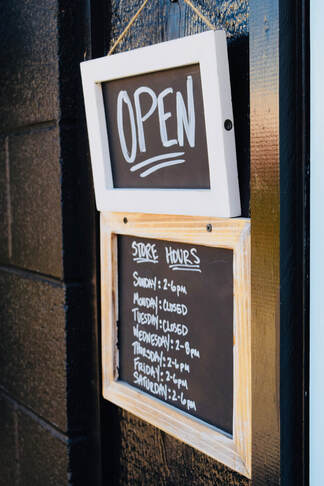 One fine February morning in 2020, I learned that a tiny little shop in an alley in Newberg, situated between a pizza place and an acupuncturist, was about to become available. I knew this because this was the tiny little hair salon I had been going to for the last few years and my stylist told me she was moving to a bigger space. Immediately, the wheels started turning—because the first time I had walked into this space I had looked around and thought it was just about the perfect size for a lavender shop. So the next day I contacted the landlord, told him I was interested, and immediately started freaking out. This was a big commitment after all. I would be tied to the shop, I’d need to work all the time to keep it stocked, I’d have to remodel—what in the world was I thinking? But I kept pushing forward. I imagined that I could sell local flowers along with my lavender products, and I just so happened to know a couple of amazing flower farmers, my friends and neighbors John and Jeremi of Pollinate Flowers. So I texted John and told him that I was thinking about opening a little shop and would they be interested in selling their flowers wholesale to me. He texted back a few minutes later asking, “Would you be interested in a partner?” I immediately texted back, “Yes I would.” This was one of the quickest and best decisions I’ve ever made. And together we moved forward. On March 1 2020, I signed the lease and picked up the keys and the shop was ours. On March 13th, schools shut down and on March 23rd our world came to a screeching halt. COVID had hit Oregon and our dream of opening our shop on May 1 (May Day) was put on hold. But as we looked around at the teal ceiling, the pink chandeliers, the warped white floor, and the light mustard colored walls, we figured that while we were waiting for the world to open back up, we might as well remodel. So we planned and dreamed and Pinterested our way into a look that we all loved and then with the incredible talent, vision, and crucial guidance of another member of the Pollinate team, Zach Goff, we started to work demo-ing, painting, building, and sewing so that we could keep moving forward. In June, before masks were mandated, we very tentatively and partially opened our doors, wearing our masks and setting up tables at the entrance to the shop so that visitors could see our products and could purchase what they wanted. A few weeks later, once masks were required statewide, we were able to fully open our shop. One side of the shop carries Little Lavender Farm products and the other side carries Pollinate flowers and products. In August our little shop made it into a Forbes magazine article titled “Summer Road Trip: Hitting America’s Lavender Trails and U-pick Farms. The author very cleverly and appropriately called our sweet little shop “Lilliputian.” This former English teacher was in heaven. In September, the final touches to the outside of our shop were finished—the awning was installed and the barn door panelling nailed to the outside—and the remodel of our shop was complete. And then the next week Oregon endured some of its worst fires in its history. Once again our hearts broke for the pain and sadness that we saw around us as we closed our doors due to the hazardous air quality. But we locked arms and together we all kept pushing forward, helping and supporting each other along the way. A few months after that, right before our first anniversary, the worst ice storm in generations hit our area, leaving our roads treacherous and many in our community without power for weeks. Once again, we had to close up for a week or so and tried to help our neighbors as much as we could. So in our first year as shop partners, we navigated a pandemic, destructive wildfires, and a debilitating ice storm. I’ve heard that the first year in business is the hardest, but wow...this one was a doozy! Then again, we figured that if we could get through such an eventful year intact, we could get through just about anything. Though hopefully we won’t have to find out any time soon. |
Categories
All
AuthorHello! My name is Pam Reynolds Baker and I am a mom/wife /writer and lavender farmer located in Dundee, Oregon. |
- Home
-
Lavender 101
- Our Lavender
- A Brief History of Lavender
- The Many Uses of Lavender Essential Oil
- Choosing the Best Essential Oil for You
- What is Hydrosol anyway?
- Lavender and Anxiety
- Lavender and Weddings
- A Lavender Home
- Lavender and Soil Amendment
- Growing Lavender in Containers
- When to harvest lavender
- Cleaning Lavender Buds
- Pruning
- Shop
- Recipes
- Writing
- Lavender Crafts
- Gallery
- About Us
- Press
- Privacy Policy

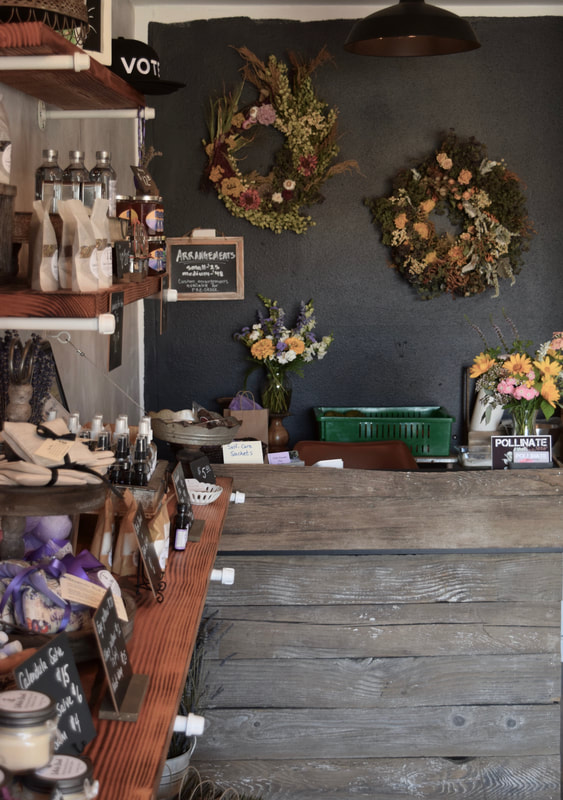
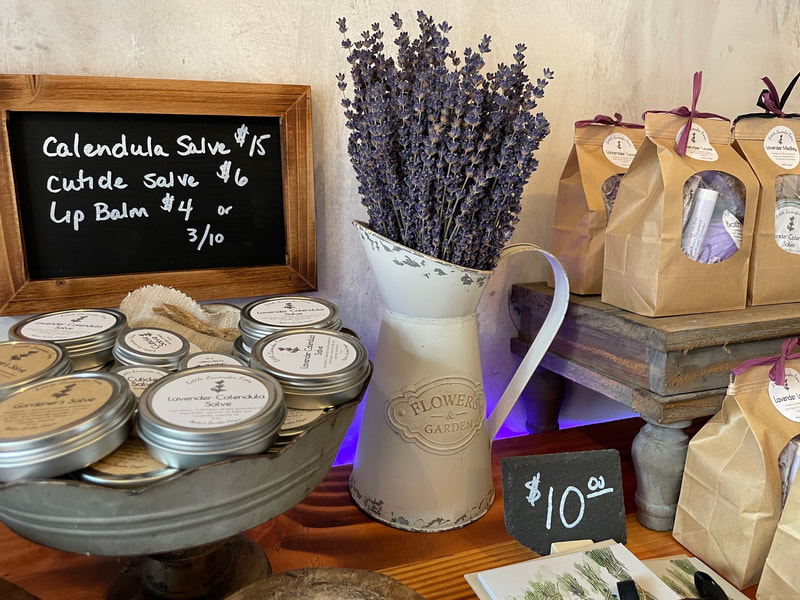
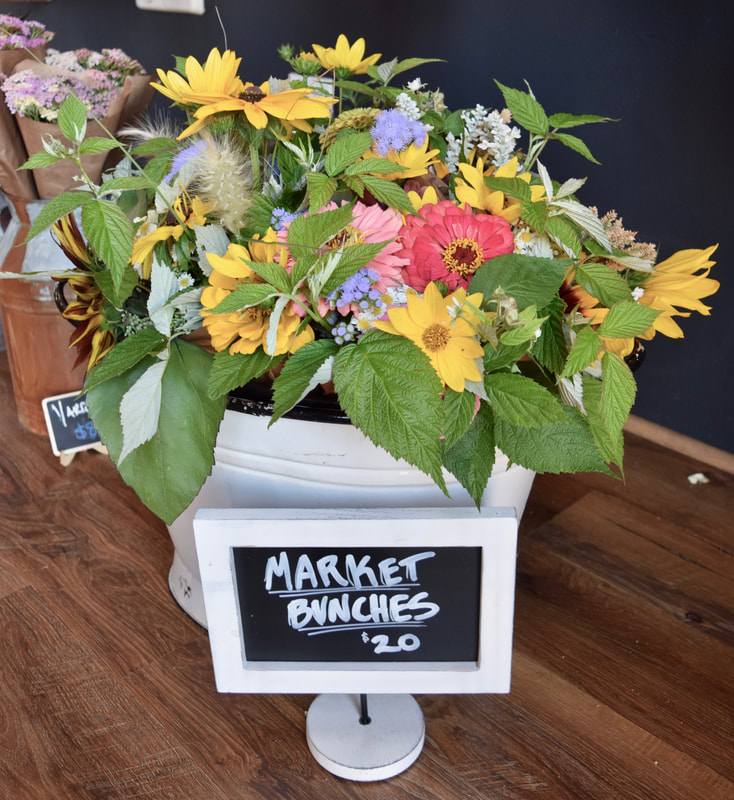
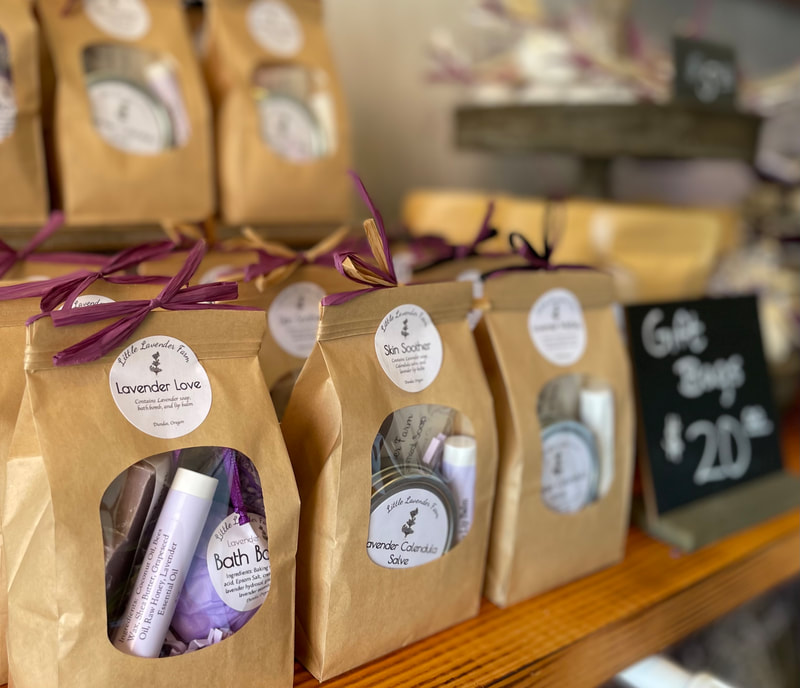
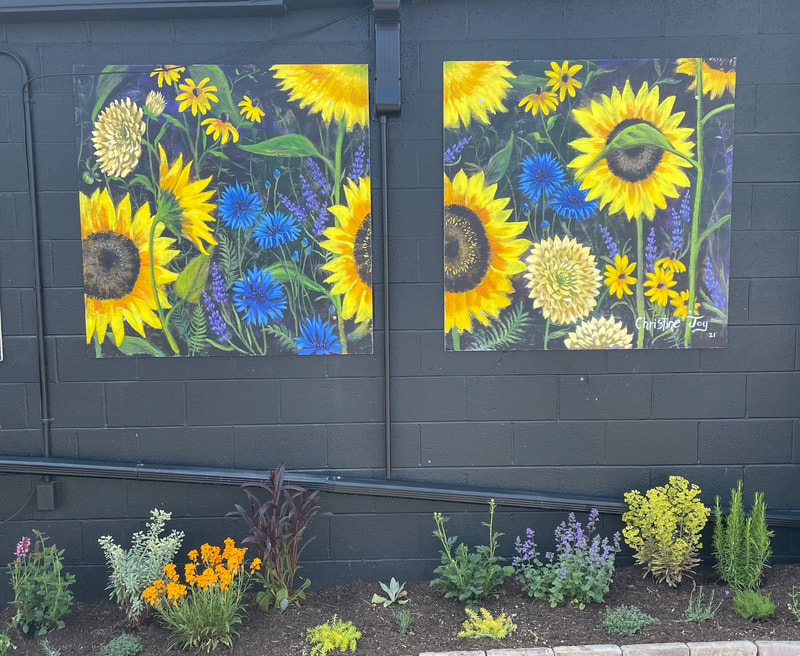
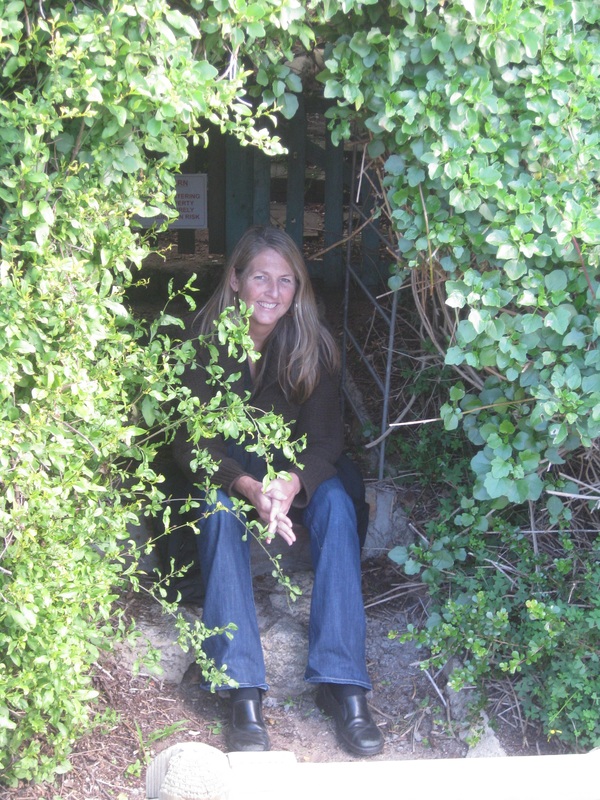
 RSS Feed
RSS Feed
